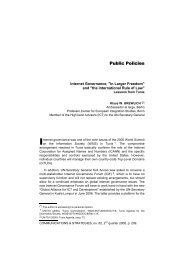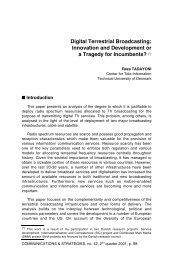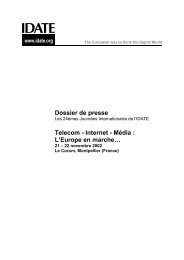134World2000 Germany. The other major incumbents are far behind: France Telecom's DSL lines number only 80,000,although the numbers are growing, and it is expected that by the end of this year 50% of their subscriberpopulation will be covered. Faced with the risk of seeing the DSL market controlled by dominant operators,the year 2000 in Europe was above all marked by debates over unbundling. Contrary to the North Americansituation, and with the exception of Germany and the Netherlands, national legislation ratified for telecomsderegulation in January '98, did not include unbundling rules. Lastly, it was only at the end of the year thatEuropean regulation rendering this principle mandatory by 1 January, 2001 was handed down.ConclusionIt is without a doubt that, prior to 2000, the telecoms sector had never found itself in the headlines to thisextent. After having begun on a basis which remained largely national, deregulation of the European marketsgave rise to the emergence, in a matter of months, to those players who could lay claim to a truly pan-European, if not global, dimension.In Europe, mobile continued to by the prime vector of this dynamic. Think only of the exceptional path takenby Vodafone (1) !Overall, however, this came about with considerable risk being taken by the players, taking into account thecost of this internationalisation, the cost of UMTS licences and networks, and the only gradually increasingearnings from mobile Internet. Marked by an, albeit expected but nevertheless brutal plunge in market ratings,the year also reflected the increasingly central role of financial markets and banking establishments.Europe thus finds itself plunged into a delicate phase where it will have to prove its ability to maintain itsleadership in the field of mobiles and to manage the players' consolidation trends — which remain lesssignificant than in the US (2) — without hindering competition.The year in the United States was marked by the opposite phenomenon, in the hands of regulatory bodiesruling on two major mergers: WorldCom's takeover of Sprint, and AOL's takeover of Time Warner. It is thefinancial markets, however which, it appears, put an end to AT&T's dreams of convergence. Even the grandlaunch of high-speed access fed analysts' doubts about the business models' maturity.On both sides of the Atlantic, then, the consequences of growth which were supposed to allow free reigningcompetition for the benefit of both the heavyweights and their rivals, appear much more complex to implementthan initially anticipated.Lastly, the only certainty which remains is that, confronted with their lowering margins and the risks inherentin new services and networks, operators will continue to radically re-paint the sector's landscape in the yearto come. It is still anyone's game, even from a strategic standpoint. In light of strategies of specialisation (eithergeographically or in terms of operation), convergence strategies will no doubt continue to proliferate with thegoal of gaining control over the various user access platforms, as will disputes over the value of theapplications they support.(1) And the total growth of mobile subscribers in Western Europe during 2000: + 80 millions!(2) See "The merger and acquisition frenzy".© IDATE www.idate.fr
World2000 135AppendixJanuary 2000• BT makes an overbid ($2.46 billion in cash) for Irish operatorEsat in an effort to beat the offer made by Telenor.• To continue its expansion policy, UPC tales out a bank loanof $1.5 billion. It recently acquired the French subsidiary ofIntercomm for 98 million euros and bought out Germanoperator Primacom for a sum of 221 million euros. UPC isalso still in the running for some of Deutsche Telekom's cablenetworks and might well be interested in the French marketthrough a partnership with Lyonnaise Communications.• AOL takes control of Time Warner in a friendly operationestimated at a record value of over $190 billion. PushingTime Warner stock well beyond the officially quoted prices,this deal clearly highlights:- AOL's interest in the 14 million Time Warner Cablesubscribers in a situation where high-speed Internetaccess with AT&T and its @Home service was becominga threat- the hoped-for complementarity with the range of TimeWarner content, also in music and video distribution.- AOL's desire to take shelter from a sudden change inInternet stock values by acquiring Time Warner'snumerous business assets. Just a few days after thisagreement, Warner Music announced a planned mergerwith EMI• It was France Telecom that ended up in taking control ofGlobal One by paying its two former partners a sum of $3.88billion, plus taking over debts evaluated at $461 million. Thedeal puts Global One's market valuation at $5.386 billion.France Telecom is now faced with the task of quicklyreassuring Global One's customers by deploying networksolutions and commercial services in areas where itspartners played a major role (USA and Germany) and whereGlobal One was inadequately represented. Backed by theinternational WorldCom offering, especially strong in Europe,Sprint need not worry, whereas Deutsche Telekom must nowmount a completely new offering to meet the requirements ofits multinational clientele.• Just when Cisco is in the process of taking over Pirelli'soptical activities, comes news of the draft agreement withTelecom Italia on its purchase of a 20% equity stake in"historic" Italian equipment manufacturer Italtel. The newsarrives nearly 10 years after the acquisition of a 20% holdingin Italtel by AT&T, a deal which ended in failure.• After acquiring the start-up, Cerent Corp., for $7.7 billion,Cisco continues to strengthen its position in opticaltelecommunications by taking over Pirelli's optoelectronicactivities. Valued at a total of $2.15 billion (in the form of ashare swap), the deal includes the acquisition by Cisco of a10% stake in the new division set up by the Italian firm foroptical components and optical submarine transmissionsystems.• Nortel pays $778 million in the form of a share swap forPromatory Communications. Somewhat like the Alcatel-Xylan deal, Nortel takes over one of its OEM suppliers, anADSL specialist with a turnover amounting to scarcely $1million.• Confirmation of the Vodafone-Vivendi alliance, and thecreation of a joint venture, Vizzavi, focused on developing amulti-access portal.February 2000• Vodafone pulls it off: with the backing of the financial marketsand their unending appreciation of the group's marketvaluation, Mannesmann had to resign itself to accepting thetakeover in a record deal valued at over 180 billion euros.The agreement gives Mannesmann shareholders 49.5% ofthe shares in the new entity, a giant of world-scaleproportions in the mobiles sector with close on 40 millionsubscribers in Western Europe (reckoned in relation to thecapital of licensed operators), that will also have to determinethe future of Orange ( which it will be forced to sold off) andof Mannesmann's fixed and Internet activities and naturallyensure the spin-off of the manufacturing business which stillin 1999 accounted for 50% of total turnover.• Little by little, Deutsche Telekom is strengthening its footholdin the French market. Having acquired operator Siris, it hasconcluded an agreement with the Lagardère group wherebyT-Online (4.2 million subscribers mainly in Germany) is totake control of Club Internet (300 000 subscribers), thirdbiggest French ISP after France Telecom's Wanadoo andAOL/Cegetel. In exchange, the Lagardère group is to obtaina 6.5% equity stake in T-Online, soon to be floated on thestock market. This move should open up T-Online tointernational business and contribute to enhancingLagardère's content and titles (press, TV) on the Internet.• Major European banks are seeking alliances to be able tocope with the effects of the Internet boom. In Spain, BBVAand Telefónica have announced an extensive agreement inthe form of a share swap, whereby the operator acquires a3% equity stake in the bank, while BBVA raises its holding inTelefónica from 9 to 10%. In addition to this exchange, BBVAtakes a 3% stake in Terra Networks, which, in turn, acquiresa 20% holding in the bank's on-line service, Uno-e.com (withan option on an increase to 35%). T-Online, still preparing forits entry into the stock market, gave out news of itsagreement with Commerzbank, whereby it will obtain 25% ofthe bank's subsidiary, Comdirect (257 000 customers). Thebank, in return, could become the third biggest shareholder inT-Online (with less than 5%) after Deutsche Telekom andLagardère.• BCE, the holding with 80% control of Bell Canada (theremaining 20% in the hands of SBC/Ameritech since lastJune) and which has accumulated large sums of cash inpace with its withdrawal from Nortel, has negotiated thetakeover of 77% of major international carrier Teleglobe in adeal evaluated at $6.65 billion (cash and swap). With BCEalready as one of its shareholders (23%), Teleglobe has beenhit in recent months by competition and the fall in price ofinternational services, plus the difficulties being experiencedby reseller Excel, operating in the US market , which it boughtfor $7 billion in 1998.• In a share swap deal valued at $3.8 billion, Global Crossingtakes control of Ixnet and its main shareholder (73%) IPC.Ixnet specialises in telephone services for trading posts.• Alcatel takes over Newbridge in a share swap deal valued ataround $7.1 billion. Benefiting from the rise in Alcatel shares,this operation will enable Alcatel to complement its range ofATM products, strengthen its position in the DSL area andbuild up its activities in the US market.• ADC fortifies its position in the DSL market by taking controlof PairGain in a share swap deal evaluated at $1.6 billion.• The consortium led by the Callahan group (already active inSpain and France) succeeds in obtaining the first lot of© IDATE www.idate.fr







